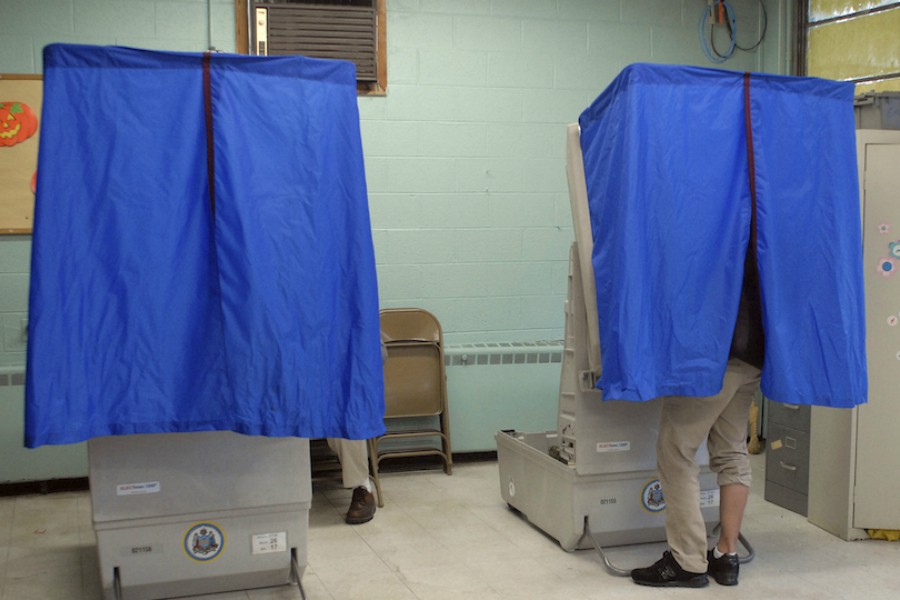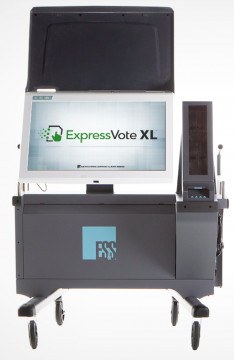Amid Controversy, City Commissioners Choose New Voting Machines
City controller Rebecca Rhynhart and citizen advocates had pushed for a hand-marked paper ballot system — and they’re not pleased with the commissioners’ vote on Wednesday.

Photo by William Thomas Cain/Getty Images
On Wednesday, Philadelphia’s city commissioners forged ahead in the process of procuring new voting machines for the city.
More than one week after they delayed a vote to select a new machine system — and against the suggestions of powerful watchdogs like state auditor general Eugene DePasquale and city controller Rebecca Rhynhart — the commissioners chose the city’s new voting machines. The problem? The oversight officials and citizen advocates aren’t pleased.

Image via Election Systems & Software
The commissioners selected the ExpressVote XL voting system from the Omaha, Nebraska-based Election Systems and Software (also known as ES&S). The machines are in accordance with the Pennsylvania Department of State’s mandate for voter-verifiable paper record voting systems.
Some background: The Department of State requires that all counties must select new paper record voting machines by December 31st — though the agency prefers the systems to be in place by the November 2019 general election. Philadelphia’s city commissioners say they’re on track to meet that desired goal. In fact, they blame what watchdogs say has been a fast-tracked process on the need to meet the governor’s deadlines.
But DePasquale isn’t buying it. In a statement issued immediately after the vote on Wednesday, DePasquale said he still has “serious concerns” about the process that led to the commissioners’ vote.
The auditor general has been monitoring the statewide voting machine procurement process since December, after it was reported that the director of the Luzerne County Elections Bureau accepted trips from a vendor that supplied the county’s electronic voting equipment and poll books. For weeks, he has aired concerns regarding the speed and transparency of Philadelphia’s procurement process. Both he and Rhynhart say they feel that the city’s request for proposals, issued in November, was written to favor one type of voting machine system. DePasquale said he felt it was written to favor ES&S, while Rhynhart said she felt it was written to favor a digital system.
The City Commissioner’s Office has maintained that officials considered several factors when they wrote the RFP, including that because of the city’s large candidate pool, they preferred a machine with “the ability to display all candidates on a screen and the whole ballot on the fewest number of screens as possible.” Deputy city commissioner Nick Custodio added that the RFP was written and released when only one voting system had been certified by the Department of State. Mike Dunn, a spokesperson for the Mayor’s Office, said that after the RFP was posted, only two of three eventually certified vendors responded.
Philadelphia meet the @essvote ExpressVote XL the new voting system approved this morning for the November 2019 Election. The new system is:
auditable
voter-verifiable
paper ballot
more resilient
follows security experts’ recommendations#PhillyVotes #VerifytheVote pic.twitter.com/IaW5Ya4Hdm
— Philadelphia City Commissioners (@PhillyVotes) February 20, 2019
Some citizen advocates had urged the city to select a hand-marked paper ballot system, which would require voters to fill out a piece of paper manually. They argued that such a system would better protect the state from targeted hacking attempts or power outages, according to the Inquirer. Controller Rhynhart agreed.
“There is much written about hand-marked ballots being viewed by experts as more reliable, and it is for this reason that I requested earlier of the Commissioners to bring in ballot security experts and use their feedback as part of the selection process,” Rhynhart said in a statement on Thursday.
But in remarks before the vote, commissioner chair Lisa Deeley said that the commissioners chose an all-machine voting method because of the “preference for the current style of voting on full-faced machines, the short timeline to retrain poll workers and voters, and the concerns of disability advocates that implementing hand-marked paper ballots would treat voters with disabilities unequally by requiring them to use a separate voting system,” according to a statement issued by the City Commissioner’s Office.
The ExpressVote XL system displays the full ballot on a 32-inch interactive screen. It also produces a paper record, which voters can verify before they cast their vote, and is ADA-compliant. The City Commissioner’s office said they are confident the machines are secure.
The city is in the process of negotiating a contract with ES&S, but Deeley said the machines are expected to cost $20 million to $27 million up-front, as well as an additional $1 million a year in operating expenses, according to the Inquirer. The newspaper reported that commissioners also selected an electronic poll book vendor called KNOWiNK for voter sign-in, which is expected to cost about $3 million up front and $3 million in additional operating costs.
Before the vote on Wednesday, Deeley said she and other commissioners weren’t pleased the speed of the procurement process, but that “any criticism about the rush to procure a new voting system should be directed to the Governor and the Department of State because we are just doing what is best for the voters given the circumstance.”
Still, Rhynhart called the decision “disappointing because the selection process was flawed,” citing a “lack of public input.”
“With this much taxpayer money at stake, taxpayers deserve more,” Rhynhart said.
In the meantime, DePasquale said he plans to announce results from his statewide voting machine procurement process overview on Friday.


